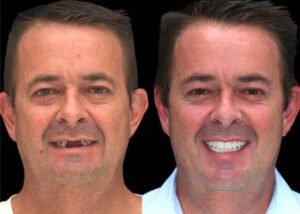If you’re missing one or more teeth and would rather not wear a partial or full denture or have bridgework, you may be considering dental implants instead. The treatment fills gaps between the teeth maintaining the mouth’s structural integrity and ensuring an aesthetically pleasing smile.
Dental implants are made to look, feel and function in the same way as natural teeth. But how do dental implants work? What are the results and what are their pros and cons?
Let’s take a closer look…
You may already know that dental implant surgery is required for a dental implant and this in itself can seem a little arduous and scary. In truth, the procedure is quite simple. To help dispel any fears you have we’ve compiled a brief dental implant guide, detailing all you need to know, So, pull up a seat and enjoy the read.
What are dental implants?
Implants replace missing tooth roots with metal fixtures and missing or damaged teeth with prosthetic teeth. A dental implant consists of a titanium metal ‘post’ that supports a dental crown and functions like just a real tooth.
The implant procedure is tailored to a patient’s condition, jaw structure and the implant that they’re getting. However, here is a brief overview in answer to the initial question of how do dental implants work.
- The jaw heals closely around the implant post following dental implant surgery in a process known as osseointegration
- The procedure takes several months but once it has occurred the dental implant becomes a permanent fixture in the mouth
- An artificial tooth (dental crown) is placed on top of the implant resulting in a restoration that looks and feels just like a real tooth.

Furthermore, implants were first used in the 1960s and ever since then, continuing research and advances in dental materials and technologies, have shown them to be a proven and reliable solution to tooth loss.
Types of dental implants
Implants can be placed into 3 categories depending on the number of teeth that need to be replaced. These are as follows:
Single implants
If you’re missing just one tooth then a patient can opt for a single dental implant. It’s a great choice because it doesn’t involve using a dental bridge which involves modifying otherwise healthy teeth to secure the bridge. Another benefit is that a single implant maintains bite function.
Multiple dental implants
These are used when patients are missing multiple neighbouring teeth. In this case, a dental bridge secured by two dental implants is a good option.
Full mouth dental implants
This involves replacing an entire arch of teeth with a combination of implants and dentures. Dentures are supported by 4 to 6 implants and depending on an evaluation of your condition and we provide a choice of fixed or removable depending upon your needs/requirements.
Are you a suitable candidate for dental implants?
Tooth implants may be right for you if you have:
- A fully grown jaw
- One or more missing teeth
- Sufficient bone to support an implant or you can have a bone graft
- Good oral health
- Health conditions that enhance bone healing
- If you struggle to wear conventional dentures
- If you have a willingness to wait several months to complete the procedure
How do dental implants work? – The procedure
The dental implant procedure is carried in multiple stages as follows:
The initial consultation
Because getting dental implants involves multiple surgeries an assessment will be made of your condition and the most suitable anaesthesia for you will also be discussed. X-rays and 3D scans will be taken and your medical history will be considered as well as any underlying conditions you may be suffering from.
Then, a custom treatment plan will be drawn up tailored to your needs before you can undergo dental implant surgery.
Potential surgeries
Depending on your unique case, you may need oral surgery to extract a damaged or severely decayed tooth or teeth to create the space for a dental implant to be placed. If your bone is thin, you may require bone graft surgery to augment the bone so that is sufficiently dense to hold the implant in place. These issues will need to be addressed before undoing dental implant surgery.
Because thorough planning is carried out before dental implant surgery takes place, the process is considered to be minor surgery and is over almost before you know it.
After dental implant surgery
Once the implants have been placed a patient enters the recovery stage during which time they need to wait for successful bone fusion (osseointegration) to take place. Once this has occurred, another short surgery will be required to attach the abutment to the implant (although this is sometimes done during dental implant surgery). This is what connects the prosthesis to the implant and also helps absorb bite pressure.
Completing the restoration
The final and most exciting part of the dental implant procedure is to place the dental crown on the top of the implant post to complete the restoration and bring your smile back to life.
Pros and Cons of Dental Implants
Pros
- High success rate (95%)
- Most durable tooth replacement treatment
- Looks just like natural teeth
- Prevents bone loss and stimulates bone growth
- Retains facial structures
- No dietary limits
Cons
- Requires dental implant surgery
- Initially more expensive than dentures and bridges
- Additional procedures such as tooth extraction and bone grafts may be required
Now you have the answer to how do dental implants work and you know what’s involved in the procedure, hopefully, you now realise that it’s not quite as daunting as you may have thought.
If you are considering dental implants, why not come and talk to the highly experienced Dr Jack Yang at Infinity Dental Care to see how he and the team can help you restore your smile.
We provide digital dental implants with flapless surgery that eliminates the need for sutures and makes for a safer, faster, and more convenient surgery for patients. Schedule your consultation, call us on (02) 9159 6237 today.
Note: Any surgical or invasive procedure carries risks. Before proceeding, you should seek a second opinion from an appropriately qualified health practitioner.


